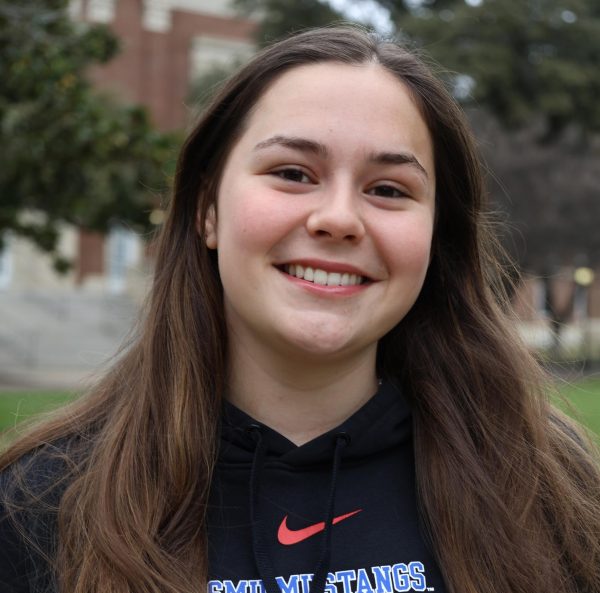Imagine NBC’s Shark Tank but instead of Mr. Wonderful, investors are from Dallas, and instead of a studio in Los Angeles, it’s hosted on SMU’s campus.
That’s a good picture of the SMU Impact Lab’s biannual Impact Pitch Event, which connects students and alumni of SMU to the broader Dallas entrepreneurial community.
The event featured four startups, each founded and presented by alumni and students of SMU. The process of being selected for a spot to pitch was competitive, with the selection and due diligence process being advised by only a few select people.
Carlos Martinez, one of the co-directors of the Impact Lab, explained that the lab connects campus by combining entrepreneurship with social and environmental impact. Martinez said that the Lab wants to connect “the economic stability of students on campus [with] the lack of economic stability off campus.”
“This is all about entrepreneurship at SMU,” he said.
The presenters sat to the left of the stage with the Advisory Board in the middle. Potential investors were scattered within the audience.
Martinez and his co-directors worked closely with the startups during the weeks prior to practice their pitches. When introducing the startups, Martinez got choked up.
“This is the part where I get emotional. These kids are just so amazing,” Martinez said.
Each startup had eight minutes to present their pitch and four minutes for questions from the audience. During the pitch, the Advisory Board took notes on paper and provided their notes to an Impact Lab student member when the presentation concluded.
Each startup included its desired investment goal and projected profit, and also received feedback from the audience.
Metasebya Solomon and Louis Jefferson created a drug to fight sickle cell disease, a blood disorder that disproportionately affects countries in Africa and those of African descent. Their startup, D-10 Therapeutics, Inc., plans to start with sickle cell and expand to other grievous diseases from there.
Panashe Siachitema, a Cox student, is working on a way to recycle batteries more sustainably. His technology, Appliwaste, harnesses AI to sort old batteries.
“I want to make this interactive,” Siachitema said. “Raise your hand if you have a drawer in your house of batteries, I know I do.” Most everyone raised their hand. “Now raise your hand if you know how to properly dispose of them.” Nearly everyone’s hand dropped.
Madison McMahan, who graduated from SMU in 2021, created VIBE. Herapp helps college students connect with others on campus and form meaningful friendships, something she struggled to find when she first moved to campus.
The last pitch was from father-son duo DeVincent and Brandon Martin. They created their business, Lumanis Environmental Solutions, when DeVincent noticed a gap in the market in solar panel recycling.
There was no lack of solar panel installations but very few companies debuted any process to recycle the materials used to create them. The glass is not hard to recycle, but the silicon used to laminate them is hazardous to remove.
“[People kept] putting up more panels and more panels and more panels, but when you think about sustainability, you have to think about the end result,” DeVincent said.
DeVincent received his master’s in sustainability and development from the Lyle School of Engineering.
Upon conclusion of the event startup owners and audience members exchanged greetings and contact information.
The next Impact Lab pitch competition will be held in October. You can find more information about their events here.
Categories:
SMU’s Community Impact Lab hosts their biannual pitch event
Tate Gasch, General Assignment Reporter
April 13, 2025
More to Discover
About the Contributor

Tate Gasch, General Assignment Reporter
Tate is a freshmen studying Journalism. She covers sports for The Daily Campus.









